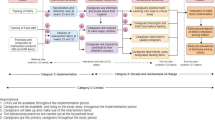Abstract
Objective
We aimed to identify key barriers to Water Sanitation and Hygiene (WASH) promotion and infant diarrhea prevention services delivered by Accredited Social Health Activists (ASHAs) in rural India.
Methods
A case-study was conducted across nine tribal villages in Banswara district (Rajasthan), where in-depth observational and qualitative data was collected from frontline health workers and infant caregivers.
Results
ASHAs’ prioritization of their incentive-based link-worker tasks over their health activist roles, limited community mobilization, and lack of monitoring of such activities hindered the delivery of WASH promotion and infant diarrhea prevention services. Caregivers’ lack of trust in ASHA’s health knowledge and preference for private providers and traditional healers also hindered the uptake of ASHA’s health promotion services.
Conclusions
Strengthening ASHAs’ health activism roles and building trust on frontline health workers’ knowledge among tribal communities will be the key to address the determinants of child malnutrition and stunting and accelerate progress towards the national development agenda.
Similar content being viewed by others
References
Lakshminarayanan S, Jayalakshmy R. Diarrheal diseases among children in India: Current scenario and future perspectives. J Nat Sci Biol Med. 2015;6:24–8.
Mbuya MNN, Humphrey JH. Preventing environmental enteric dysfunction through improved water, sanitation and hygiene: An opportunity for stunting reduction in deve-loping countries. Matern Child Nutr. 2016;(Suppl 1): 106–20.
Ministry of Health and Family Wellfare. Accredited Social Health Activist (ASHA) Operational Guidelines for ASHA under NRHM [Internet]; 2005. Accessed April 6, 2021. Available from: https://nhm.gov.in/images/pdf/communitisation/task-group-reports/guidelines-on-asha.pdf
Sharma R, Webster P, Bhattacharyya S. Factors affecting the performance of community health workers in India: a multi-stakeholder perspective. Glob Health Action. 2014;7: 25352.
NITI Aayog. Accelerating Progress on Nutrition in India: What will it take? Third Progress Report on POSHAN Abhiyaan. New Delhi [Internet]; 2020. Accessed March 30, 2021. Available from: http://www.niti.gov.in/sites/default/files/2020–10/AbhiyaanMonitoringReport.pdf
Directorate of Census Operations. District Census Handbook: Banswara. Banswara, Rajasthan [Internet]; 2011. Accessed April 01, 2021. Available from: https://censusindia.gov.in/2011census/dchb/0827_PART_B_DCHB_BANSWARA.pdf
International Institute for Population Sciences (IIPS). National Family Health Survey — 4: 2015–2016. District Fact Sheet Banswara, Rajasthan [Internet]; 2016. Accessed April 06, 2021. Available from: http://rchiips.org/nfhs/FCTS/RJ/RJ_FactSheet_125_Banswara.pdf
National Health Systems Resource Centre (NHSRC). Which way forward? Evaluation of ASHA Programme. New Delhi [Internet]; 2011. Accessed April 06, 2021. Available from: https://nhm.gov.in/images/pdf/communitisation/asha/Studies/Evaluation_of_ASHA_Program_2010–11_Report.pdf
Parikh P, Kwami C, Khanna R, et al. Linkages between environmental factors (WASH and Energy) and Infant and Young Child Feeding practices in rural India: implications for cross-sectoral interventions for child health. J Water Sanit Hyg Dev. 2021;11:902–15.
Green J, Thorogood N. Qualitative methodology in health research. In: eds. Qualitative Methods for Health Research. 4th ed. 2004. p. 23–65.
Kawade A, Gore M, Lele P, et al. Interplaying role of healthcare activist and homemaker: A mixed-methods exploration of the workload of community health workers (Accredited Social Health Activists) in India. Hum Resour Health. 2021;19:1–12.
Pande B. Are health workers effective in tribal part? Results from evaluation survey of health workers from tribal community. Int J Adv Community Med. 2020;3:215–7.
Dasgupta R, Roy S, Lakhanpaul M. An uphill task for POSHAN abhiyan: examining the missing link of ‘convergence’. Indian Pediatr. 2020;57:109–13.
Sundararaman T, Ved R, Gupta G, Samatha M. Deter-minants of functionality and effectiveness of community health workers: results from evaluation of ASHA program in eight Indian states. BMC Proc. 2012; 6(Suppl 5):O30.
Vir SC, Kalita A, Mondal S, Malik R. Impact of commu-nity-based mitanin programme on undernutrition in rural Chhattisgarh State, India. Food Nutr Bull. 2014;35: 83–91.
Acknowledgements
Mr Pramod Pandya and Mr Hemant Chaturvedi and other Rajasthan office staff for their support in data collection logistics. We thank the PANChSHEEEL team for the groundwork done on which this study builds up.
Funding
Funding: CHR-CIO PhD studentship at UCL GOS-ICH, with further travel funding from the UCL Chadwick Trust. ML was supported by NIHR-BRC based at UCL ICH/Great Ormond Street Hospital NHS Foundation Trust.
Author information
Authors and Affiliations
Contributions
Contributors: ML, PP, RD and the PANChSHEEEL team: developed the initial project idea; JVG: carried out the data collection, while supervised by all other co-authors; JVG: analysed the data with contributions from RD; JVG: drafted the manuscript with inputs from RD, ML, PP, LC. All authors read, edited, and approved the final manuscript.
Corresponding author
Ethics declarations
Ethics clearance: UCL Research Ethics Committee in the UK, No.4703/001; and the Institute of Health Management Research Ethics Committee in India, No. 04/05/2019-01.
Competing interests: None stated.
Additional information
Note: Supplementary matter related to this article is available at https://www.indianpediatrics.net
Electronic supplementary material
Rights and permissions
About this article
Cite this article
Vila-Guilera, J., Dasgupta, R., Parikh, P. et al. Barriers to the Delivery and Uptake of Water Sanitation and Hygiene (WASH) Promotion and Infant Diarrhea Prevention Services: A Case Study in Rural Tribal Banswara, Rajasthan. Indian Pediatr 59, 38–42 (2022). https://doi.org/10.1007/s13312-022-2418-4
Received:
Revised:
Accepted:
Published:
Issue Date:
DOI: https://doi.org/10.1007/s13312-022-2418-4




